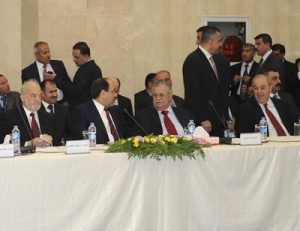IRBIL, Iraq – Leaders of all the main Iraqi political blocs met Monday for the first time since March elections in a new push to break the eight-month deadlock over forming a

new government. Car bombs struck the country’s two holiest cities and killed 14 people, a reminder that insurgents remain determined to destabilize Iraq.
The 90-minute meeting of political leaders in the northern town of Irbil kicked off three days of negotiations that could signal the deeply divided political blocs are close to a power-sharing agreement. However, officials said there are still major obstacles to overcome.
Since inconclusive March 7 elections, insurgents have tried to exploit political uncertainty over the new government with periodic violence. Monday’s blasts were the third major attacks since last week, following the slaughter of more than 50 Christians in a Baghdad church and a string of 13 coordinated bombings across Baghdad that killed more than 70 people.
Prime Minister Nouri al-Maliki, who is fighting to keep his job, was among the leaders who attended the meeting in Irbil. His main rival, Ayad Allawi, was also there. Allawi heads the Sunni-backed Iraqiya coalition that won 91 seats, more than any other party, in the parliamentary election. Al-Maliki’s bloc took second with 89 seats.
But no party won an outright majority in the 325-seat parliament and the blocs have spent the past eight months haggling to form alliances that could lead to a government inclusive enough so that it will not trigger a new outbreak of sectarian strife that just a few years ago brought Iraq to the brink of civil war.
Al-Maliki described the meeting as a new push forward by the political blocs to reach an agreement.
“We need to open a new page and leave the past behind,” he said.
Others who attended pointed to difficulties in forging an agreement between political parties that have in the past fought their battles on the streets and still view each other with deep suspicion.
Vice President Tareq al-Hashimi, a Sunni from the Iraqiya alliance, warned that negotiating committees who have been meeting for weeks before the Irbil summit had left many of the most contentious issues to the leaders to work out.
“Based on that, I do not think that the leaders will be able to solve these sticking points because they need a lot of discussion and study,” he said. “I do not know how the leaders, today and tomorrow, will be able to discuss this list of sensitive and strategic issues during this short period of time.”
After the nationally televised meeting concluded, the political leaders agreed to meet again in Baghdad the following day before flying out of Irbil.
Massoud Barzani, president of the Kurdish Autonomous Region in northern Iraq, lobbied for the meeting to be held in Irbil, seat of the Kurdish government. Also in attendance in the large auditorium were Ammar al-Hakim, who heads the Iranian-backed Supreme Islamic Iraqi Council, followers of anti-American cleric Muqtada al-Sadr, Iraqi President Jalal Talabani, and Iraq’s other vice president, who is a Shiite, Adel Abdul-Mahdi.
Two separate car bombings struck Iraq’s two holiest cities, Karbala and Najaf, the sites of important shrines revered by the country’s Shiite majority.
Hours before the political leaders met, seven pilgrims were killed in a car bomb blast in the holy Shiite city of Karbala, 50 miles (80 kilometers) south of the Iraqi capital.
Police and hospital officials said dead included six Iranians and one Iraqi and that at least 35 others were wounded in the blast, including Iranian and Pakistani nationals.
The car bomb exploded at a parking lot in central Karbala that is used by pilgrims traveling between Iraq’s holy sites. Such parking lots have often been targeted by Sunni militants unable to get close to the holy shrines due to beefed up security.
Later Monday a suicide bomber blew himself up just 500 yards from the shrine of Imam Ali, one of the most revered Shiite saints and a cousin of the Prophet Muhammad, killing seven people including two Iranian pilgrims, according to police and hospital officials.
The officials spoke on condition of anonymity because they were not authorized to speak to the media.







